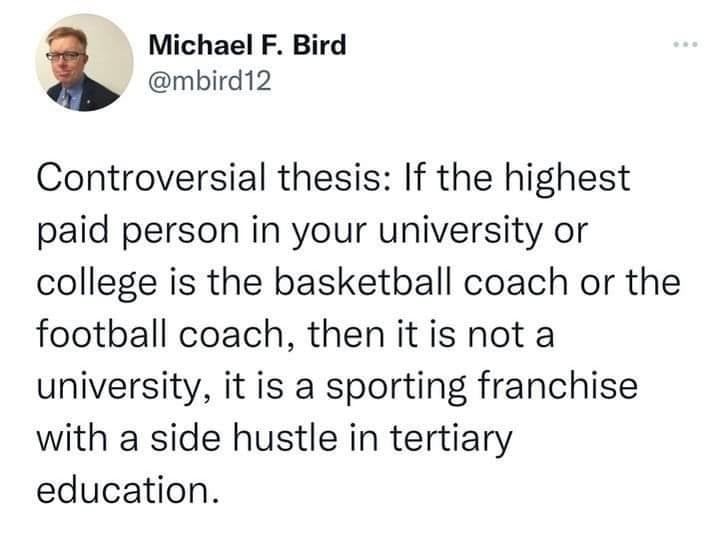this post was submitted on 19 Dec 2023
1424 points (99.1% liked)
Memes
50264 readers
650 users here now
Rules:
- Be civil and nice.
- Try not to excessively repost, as a rule of thumb, wait at least 2 months to do it if you have to.
founded 6 years ago
MODERATORS
you are viewing a single comment's thread
view the rest of the comments
view the rest of the comments

Yeah, the few at the top bring in revenue, but most don't. Speculating on future revenue is not helpful.
If you'd read the links I shared, you'd see the revenue figures include alumni donations, and they're still a net negative for the majority of schools.
Not true? Even schools as low as 220 in that list are bringing in a profit, admittedly not as much, but if we only look at the schools that have the vastly overpaid coaches then we start only looking at the schools that are bringing in multiple millions of dollars a year. The usatoday numbers include contributions as well, and as the Princeton paper shows those donations increase with high performing teams (again the teams with overpaid coaches).
As for your articles, in your first link look at the schools that are actually taking money for athletics. These are all tiny schools, without a major cfb or m/wbb program to subsidize the rest of athletics. So again the schools with crazy overpaid coaches aren't taking much tuition money (searching for the cfb bluebloods in that list shows most charge no money or somewhere in the range of 30 to 50 dollars annually, so covering your costs at the student rec center effectively).
For your second article, we're only looking at P5 schools, not D1. This is good as it gives us a better look at the schools with overpaid coahces. But the number in the article is cherry picked. They are using generated revenue for that figure, not total revenue. If you follow their own link (https://www.ncaa.org/sports/2019/11/12/finances-of-intercollegiate-athletics-database.aspx) and look at the numbers for total net you'll see P5 is bringing in on average 4.9 million and this is from the NCAA's numbers themselves. Admittedly looking at the range you'll find a P5 school losing 34 million last year. What's important to note with these figures is that often P5 programs are jumping back and forth from red to black year over year as they continually expand facilities. And with there being only one football stadium per university, this mostly means upgrades to student athletic facilities/equipment or non revenue sport facilities/equipment.
Your last article seems to mostly be a pro NIL piece laying out why college athletes deserve to be paid. And for what it's worth I think that you're right here. Especially revenue earning teams should see some of that revenue go towards their athletes. Those young men and women are putting their bodies on the line for their respective universities and deserve compensation for that.
At the end of the day, I think it's no coincidence that the schools with the overpaid coaches are bringing in more money than the schools that don't put as much emphasis on athletics. And I totally believe that the presidents of these huge universities know better than either of us when it comes to running and funding their schools. Even if I believe that the money coaches earn is ridiculous. Also if you want to get really upset, look up how much Jimbo Fisher is getting paid to NOT coach at Texas A&M.